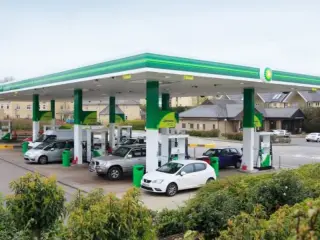
When it comes to manging a business fleet, accessibility, flexibility, and control are everything – especially when it comes to fuel. For UK fleet operators, the BP Fuel Card has long been a trusted choice, but is it the most connected option out there?
In this blog, we break down how the BP Fuel Card compares to other providers, what “connected” really means for fleets, and why a wider acceptance network could be the key to maximising operational efficiency.
What do we mean by connected?
A connected fuel card goes beyond just refuelling at BP-branded stations. It means:
Access to a wide multi-brand network across the UK.
Seamless motorway coverage to avoid detours and delays.
Integration with telematics and fuel reporting tools.
Compatibility with existing accounting or expense systems.
Support for sustainability goals and evolving fuel types.
Why BP? A network that keeps fleets moving
With over 3,400+ fuel stations available through the BP fuel card’s partner network, including BP, Esso, Texaco, Gulf, and more, it’s one of the most widely accepted cards on the market.
Key Features Include:
Over 1,200 BP-Branded stations.
Access to 90% of UK motorways.
24/7 Refuelling at key transport locations.
Pin-secured cards with fraud protection.
Online portal for real time spends tracking and controls.
All of this makes BP a strong choice for businesses looking to avoid unnecessary detours or downtime – especially those with time-sensitive delivery schedules or multi-region fleets.
Designed with fleets in mind
Fleet managers need more than fuel. They need insight and control. The BP Fuel Card delivers features tailored for UK fleet operations:
Detailed transaction reporting for cost control and compliance.
Consolidated HMRC-approved invoices.
Driver-level controls to set limits and prevent misuse.
Online tools to review trends and optimise refuelling routes.
These features allow fleet managers to track vehicle efficiency, spot irregularities, and even reduce driver stress by ensuring convenient and fast refuelling stops.
Is BP the right fit for mixed fleets?
If your fleet consists of a combination of cars, vans, and HGVs, BP’s extensive network offers high-coverage diesel access and HGV-compatible forecourts, many of which have high canopies and wider lanes for commercial vehicles.
Fleet operators can also tailor card controls to match different vehicle types, giving a better grip on usage and spend, without compromising coverage.
Comparison in practice
Let’s just say that your fleet operates across Manchester, Birmingham and Glasgow. With the BP card, your drivers can:
Refuel at BP-branded stations in urban centres.
Fill up at Texaco or Esso sites in more remote areas.
Avoid doubling back or detouring, especially on motorways.
Pay one invoice across all stations used.
That isn’t just more convenient, it is also more economical. Fewer miles spent searching for fuel, equals overall lower operational costs and reduced CO2 emissions.
Final thoughts
Is the BP card the most connected card for UK fleets? In short – yes, BP stands out as one of the most connected, flexible and fleet-ready fuel cards sin the UK.
It’s extensive network motorway coverage and fleet first attitude make it ideal for businesses seeking reliability, efficiency and control.
Whether you are a national courier service, a regional trades business, or an HGV operator, the BP Fuel Card offers a smart route to better fuel management and a smarter business.
For more information, or if you are ready to apply for your card today see more here.




